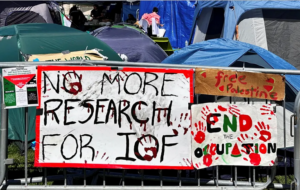Israel is already becoming an international pariah. Do Israelis care?

Activists from Amnesty International during a rally outside the White House for Global Day of Action Against Sending Arms to Israel, 2 May 2024
Dahlia Scheindlin writes in Haaretz on 8 May 2024:
In early April, at the six-month mark of the Israel-Hamas war, numerous headlines focused on Israel’s international isolation. A headline in The Guardian blared: “Isolated abroad, torn apart at home,” while the Associated Press declared somberly that “After six months of war, Israel’s isolation grows.” For creative competition, Reuters ran “Six months into Gaza war, Israel faces deepening isolation.”
The examples were alarming. Israel has faced proceedings against it in the International Court of Justice; the UN Security Council passed a cease-fire resolution in late March; and even Israel’s allies were emitting signals of disapproval. The United States, Israel’s greatest ally and patron, conveyed a strong preference for Israel to change course – abstaining in the Security Council vote, sanctioning some settlers, and issuing angry statements particularly regarding the humanitarian situation in Gaza and Israel’s strike that killed seven World Central Kitchen aid workers. Individual countries and the European Parliament have voted on various measures calling on Israel to change course.
Do Israelis care about such international currents, and if so, why weren’t they clamoring for their country to change course? The answer is in part that the “global isolation” was still more warning than bite during this phase; most Israelis experienced it emotionally but not personally. And Israelis have a long-established practice of deflecting blame for such opprobrium on anything but their policies. But both factors are becoming obsolete.
Less bark, more bite
Most of the countermeasures taken by the international community in the first half year of the Gaza war did not truly constrain Israel or individuals, and amounted to little more than bad vibes.
America made disapproving noises but kept passing sprawling financial aid and arms packages. Its abstention in the Security Council was neatly offset by the U.S. ambassador’s declaration that the vote wasn’t legally binding. Canada announced that it would end weapons exports, but it barely registers as an Israeli supplier. The United States had slapped sanctions on a few settlers, but this did not affect the war. It then announced it would sanction a specific Israel Defense Forces battalion in mid-April, but paused the idea within just a few days. The International Court of Justice proceedings make Israelis angry but do not target individuals.
The new wave of isolation developments, by contrast, is putting substance over style. Last week, Colombia’s president announced that the country would cut diplomatic ties with Israel. Shortly afterward, Turkey announced it would shutter all trade with Israel until a cease-fire – a stunning blow.

Pro-Palestinian signs at an encampment on the campus of MIT, on Tu
Louis Fishman, a professor at Brooklyn College specializing in Turkey and Turkish-Israel affairs, and a frequent Haaretz contributor, observed that no matter how tense the public political exchanges between Benjamin Netanyahu and Recep Tayyip Erdogan have sometimes been, there was a tacit agreement that “you never touch trade.” The ripple effects could be extensive, Fishman explained: Trade between the two countries has been climbing toward $9 billion a year. Turkish exports and labor are important for Israel’s construction industry, and Turkey exports a long list of raw materials to Israel alongside food, produce, textiles and other items.
Turkish Airlines is a major carrier for both Israelis and Palestinians, to and from Turkey, says Fishman – meaning that Turkey will face economic consequences as well. These, though, are apparently overshadowed by domestic political gains. With Belgium making the case for economic sanctions, it’s plausible that the political-economic calculus could spread to other countries too.
Will Israel truly become isolated in terms of trade and integration into the global economy? It still feels somewhat theoretical. Israel’s vaunted high-tech and innovation sector, for example, depends heavily on private investment, often from abroad. This field mostly withstood Israel’s political turmoil of 2023 and so far seems to be weathering the war. Since October 7, Startup Nation Central reported that from October through November, private investments in Israeli startups first rose, then declined in the following months. But the United States saw the same trend, with little indication that the war was to blame for the Israeli slowdown.
Moreover, the Israeli tech industry rallied to help itself: 20 new funds were established for investment, and nearly a dozen were specifically founded to help bridge funding gaps, according to Startup Nation Central’s report. OurCrowd, a global venture investing platform, established one of the biggest such funds. Matthew Kalman, chief content officer and head of marketing at the company, noted in an interview that due to government matching, the funds OurCrowd raised helped “unlock” about $100 million.
This internal rallying, or resilience, seems to have propped up the high-tech sector for now. Kalman said: “There may have been some delays in closing investment rounds, but in terms of products and services being delivered from Israeli startups, they did not seem to be affected.” That’s because even in companies where “25 percent of their workers just disappeared into the army … others just stepped up.”
The war could even be a boon to Israel’s defense exports (around 16 percent of Israel’s exports in 2022), with a whole catalog of items now freshly battle-tested. And global dependence on Israeli technology in diverse fields will make it hard for that world to just cut Israel off. That’s lucky, since high-tech makes up nearly half of the country’s exports and 30 percent of the country’s revenues.
The error of complacency
But while Israel’s tech strength can distract, or lull Israelis, other critical fields – from Israel’s military industry to academia to diplomacy – are already being affected. This is not a warning or prediction: the process is already underway.
A growing number of countries are slowing the flow to Israel’s military industries: In February, a Dutch court ordered the country to stop exporting certain parts Israel needs for F-35s, if Israel was the end recipient. Canada announced in March it will cease to export weapons to Israel, and Italy’s foreign minister claimed the country had stopped sending arms to Israel from October 7. These countries are not major arms suppliers to Israel, but a recent report on global arms trade did name Italy as Israel’s third biggest supplier, albeit making up a tiny portion.
The United States, of course, represents Israel’s greatest supplier, and the Biden administration has steadfastly resisted pressure to cease or condition military aid. Mostly. Reports of delayed weapons transfers earlier this year were followed this week by the most explicit pause of weapons transfer from the Americans, as a warning to Israel not to expand its Rafah operation.
In the longer term, an arms slowdown could be compounded by efforts to end military research partnerships. A group called “MIT Scientists Against Genocide Encampment” is calling to end Israeli Defense Ministry sponsorship of its “war-related research,” arguing that “MIT does not receive funding from any other foreign military” but has received $11 million from Israel. The group also notes that MIT ended its academic collaboration with a Russian technology institute just days after Russia invaded Ukraine in 2022. While the causes of these wars are different, the MIT group is protesting Israel’s conduct, and MIT’s recent precedent with Russia undermines the accusation of singling out Israel.
Academia, of course, is becoming ground zero for attempts to isolate Israel. Campus protests have rocked the United States for weeks in their latest iteration, spreading to dozens of schools throughout the country. Several have reached agreements with the student protesters, including Brown University, University of California, Riverside, Northwestern University and Evergreen State College. The details of these agreements differ; the path to actual divestment from Israeli companies is long, complex and far from guaranteed. But broadly, the agreements are an opening for the protesters’ demands to be heard in these universities’ investment decisions going forward.

Students and faculty calling upon the University of Texas to fully divest from Israel, May 2024
Hussein Ibish, a senior resident scholar at the Arab Gulf States Institute in Washington, believes that the stage is set for a full-blown wave of university divestment. He explained in an interview that universities will have a very hard time resisting such demands in the future, largely because of a different recent historic precedent: policies against university investments in South Africa’s apartheid regime. Ibish noted that “it’s going to be extremely difficult for anyone on campus to argue with a straight face that [the Israeli state] does not engage in apartheid in the West Bank. … To argue that this doesn’t qualify as a form of apartheid, you’re going to look ridiculous, like a fool and a shill.”
Ibish said that this prediction is predicated on certain conditions – for example, that the protests endure beyond the current end-of-semester crescendo, and that the activists focus on the “D” of BDS – since boycott and sanctions are wrong, in his mind.
Critically, he believes U.S. students must limit their message to the occupied territories: “If they’re going to call for academic and cultural boycotts, they’ll be defeated because it’s morally and philosophically wrong. If, however, they get smart in the coming years and focus only on the occupied territories and say that … it’s the ’67 occupation, not the 1948 thing, then it’s a winning issue. They will win.”
Observing the current campus protests, they are anything but limited to the 1967 occupation. But maximalist revolutionary elements might well be tempered by hard strategic considerations with time.
For many Israeli academics, there is no need to speculate. Dozens have already had personal experience of canceled invitations to speak, submit articles, co-author or apply for funds with counterparts abroad, as reported in an extensive investigation by Or Kashti in Haaretz. The combined effect of ending such partnerships could cut Israel off from global research and deal a “mortal blow” to Israeli academia as a whole, according to the vice president of Tel Aviv University cited in the article.
Israel’s response: Double down
For weeks and months, it has been clear that an IDF operation in Rafah would be a turning point. A former Egyptian diplomatic source conveyed that the specter of such an incursion into Rafah has opened up a highly sensitive public debate in Egypt about whether a possible expulsion of Gazans into Egypt represents a breach of the Israel-Egypt peace treaty.
The United States, Egypt and Israel all have a profound interest in maintaining that treaty, but the relationship will be severely tested. And last week, Israel got word that the International Criminal Court might begin to issue arrest warrants against Israeli officials. Yet this week, Israel rushed the Rafah crossing raising the specter of a full Rafah operation, which would deepen its international quagmire.
Israel’s official position, and general orientation, always prefers to deflect blame by presuming that anti-Israel, antisemitic sentiment is the root of these trends, or terrible Israeli hasbara. But it’s undeniable that the worst such international developments for Israel appeared only because of this war, and even those are only beginning after roughly half a year of it. For decades, Israel has enjoyed robust and growing global integration; now the ride is poised to end. Israelis can either face their loss on the global stage and change course, or continue to deflect. But it won’t be the same kind of state on the other side.
This article is reproduced in its entirety
